Lecturer/Speaker Bios
Javier Aula-Blasco
 Dr. Javier Aula-Blasco is a Research Engineer at the Barcelona Supercomputing Center (BSC). He holds a PhD in Psycholinguistics, an MSc in Natural Language Processing and an MSC in Language Education. He has taught and lectured in graduate and postgraduate courses at universities such as The University of Edinburgh and Imperial College London. He has also worked as an external quality assessor for Madri+d and AQU Catalunya. At BSC, Javier is the Coordinator for the Evaluation and Annotation Team within the Language Technologies Unit Text group. His and his group’s work aims to create a comprehensive evaluation setup for multilingual large language models, generate high-quality evaluation multilingual datasets, and improve the human side of model evaluation, among others.
Dr. Javier Aula-Blasco is a Research Engineer at the Barcelona Supercomputing Center (BSC). He holds a PhD in Psycholinguistics, an MSc in Natural Language Processing and an MSC in Language Education. He has taught and lectured in graduate and postgraduate courses at universities such as The University of Edinburgh and Imperial College London. He has also worked as an external quality assessor for Madri+d and AQU Catalunya. At BSC, Javier is the Coordinator for the Evaluation and Annotation Team within the Language Technologies Unit Text group. His and his group’s work aims to create a comprehensive evaluation setup for multilingual large language models, generate high-quality evaluation multilingual datasets, and improve the human side of model evaluation, among others.
Rosa Badia
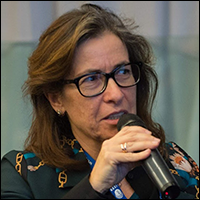 Rosa Badia holds a PhD on Computer Science (1994) from the Technical University of Catalonia (UPC). She is the manager of the Workflows and Distributed Computing research group at the Barcelona Supercomputing Center (BSC). Her current research interest are programming models for complex platforms (from edge, fog, to Clouds and large HPC systems). The group led by Dr. Badia has been developing StarSs programming model for more than 10 years, with a high success in adoption by application developers. Currently the group focuses its efforts in PyCOMPSs/COMPSs, an instance of the programming model for distributed computing including Cloud. Dr Badia has published near 200 papers in international conferences and journals in the topics of her research. Her group is very active in projects funded by the European Commission and in contracts with industry. Dr Badia is the PI of the eFlows4HPC project.
Rosa Badia holds a PhD on Computer Science (1994) from the Technical University of Catalonia (UPC). She is the manager of the Workflows and Distributed Computing research group at the Barcelona Supercomputing Center (BSC). Her current research interest are programming models for complex platforms (from edge, fog, to Clouds and large HPC systems). The group led by Dr. Badia has been developing StarSs programming model for more than 10 years, with a high success in adoption by application developers. Currently the group focuses its efforts in PyCOMPSs/COMPSs, an instance of the programming model for distributed computing including Cloud. Dr Badia has published near 200 papers in international conferences and journals in the topics of her research. Her group is very active in projects funded by the European Commission and in contracts with industry. Dr Badia is the PI of the eFlows4HPC project.
Andrea Bartolini
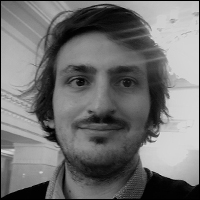 Andrea Bartolini holds an assistant professor (RTD-B) position with the Department of Electrical, Electronic and Information Engineering (Guglielmo Marconi) at the University of Bologna. He was a postdoctoral researcher with Integrated Systems Laboratory, Swiss Federal Institute of Technology, Zurich. He has authored or co-authored more than 135 papers in peer-reviewed international journals and conferences, and several book chapters with focus on dynamic resource management—ranging from embedded to large scale HPC systems. He has collaborated with several international research and companies. Andrea Bartolini has been the main responsible for the design of advanced power management and monitoring support on the first Cavium ThunderX cluster, the D.A.V.I.D.E. and Marconi100 supercomputers. Since 2018 Andrea Bartolini serves as the technical leader for the European-processor-initiative power management design. In 2021, Andrea Bartolini collaborated with CINECA and E4 engineering in the design of the Monte Cimone HPC cluster – the first RISC-V HPC cluster.
Andrea Bartolini holds an assistant professor (RTD-B) position with the Department of Electrical, Electronic and Information Engineering (Guglielmo Marconi) at the University of Bologna. He was a postdoctoral researcher with Integrated Systems Laboratory, Swiss Federal Institute of Technology, Zurich. He has authored or co-authored more than 135 papers in peer-reviewed international journals and conferences, and several book chapters with focus on dynamic resource management—ranging from embedded to large scale HPC systems. He has collaborated with several international research and companies. Andrea Bartolini has been the main responsible for the design of advanced power management and monitoring support on the first Cavium ThunderX cluster, the D.A.V.I.D.E. and Marconi100 supercomputers. Since 2018 Andrea Bartolini serves as the technical leader for the European-processor-initiative power management design. In 2021, Andrea Bartolini collaborated with CINECA and E4 engineering in the design of the Monte Cimone HPC cluster – the first RISC-V HPC cluster.
Luca Benini
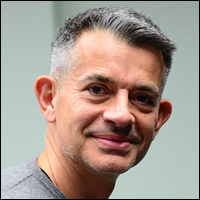 Luca Benini holds the chair of digital Circuits and systems at ETHZ and is Full Professor at the Universita di Bologna. He received a PhD from Stanford University. Dr. Benini’s research interests are in energy-efficient parallel computing systems, smart sensing micro-systems and machine learning hardware. He is a Fellow of the IEEE, of the ACM and a member of the Academia Europaea. He is the recipient of the 2016 IEEE CAS Mac Van Valkenburg award, the 2020 EDAA achievement Award, the 2020 ACM/IEEE A. Richard Newton Award and the 2023 IEEE CS E.J. McCluskey Award.
Luca Benini holds the chair of digital Circuits and systems at ETHZ and is Full Professor at the Universita di Bologna. He received a PhD from Stanford University. Dr. Benini’s research interests are in energy-efficient parallel computing systems, smart sensing micro-systems and machine learning hardware. He is a Fellow of the IEEE, of the ACM and a member of the Academia Europaea. He is the recipient of the 2016 IEEE CAS Mac Van Valkenburg award, the 2020 EDAA achievement Award, the 2020 ACM/IEEE A. Richard Newton Award and the 2023 IEEE CS E.J. McCluskey Award.
Josep Lluis Berral
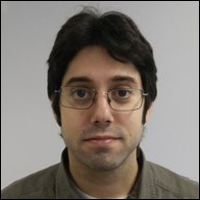 Josep Lluís Berral received his Engineering degree in Informatics (2007), M.Sc. in Computer Architecture (2008), and Ph.D. in Computer Science (2013) at BarcelonaTech-UPC. He works in high-performance data-analytics and machine learning on cloud environments at the Department of Computer Architecture @ Barcelona-Tech (DAC-UPC) and the Barcelona Supercomputing Center (BSC). He is the manager of the “Computing Resources Orchestration and Management for AI” group (UPC + BSC). He is currently collaborating in European projects and private projects with Intel and IBM, and previously with Databricks, Microsoft, Cisco and Petrobras. He did research at the “High-Performance Computing” group and at the “Relational Algorithms, Complexity and Learning” group at UPC. He has also been at the DarkLab group at Rutgers University (Piscataway, NJ) in 2012, also in IBM Watson Labs (Yorktown, NY) in 2019. He was awarded with a Juan de la Cierva research fellowship from the Spanish Ministry of Economy in 2016. He is an IEEE and ACM member.
Josep Lluís Berral received his Engineering degree in Informatics (2007), M.Sc. in Computer Architecture (2008), and Ph.D. in Computer Science (2013) at BarcelonaTech-UPC. He works in high-performance data-analytics and machine learning on cloud environments at the Department of Computer Architecture @ Barcelona-Tech (DAC-UPC) and the Barcelona Supercomputing Center (BSC). He is the manager of the “Computing Resources Orchestration and Management for AI” group (UPC + BSC). He is currently collaborating in European projects and private projects with Intel and IBM, and previously with Databricks, Microsoft, Cisco and Petrobras. He did research at the “High-Performance Computing” group and at the “Relational Algorithms, Complexity and Learning” group at UPC. He has also been at the DarkLab group at Rutgers University (Piscataway, NJ) in 2012, also in IBM Watson Labs (Yorktown, NY) in 2019. He was awarded with a Juan de la Cierva research fellowship from the Spanish Ministry of Economy in 2016. He is an IEEE and ACM member.
Adria Blanco
 Backend and infrastructure engineer at Qilimanjaro-Quantum Tech.
Backend and infrastructure engineer at Qilimanjaro-Quantum Tech.
Jorge Ejarque
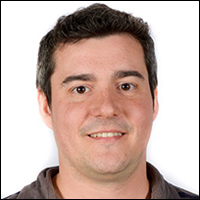 Jorge Ejarque holds PhD on Computer Science (2015) from the Technical University of Catalonia (UPC). From 2005 to 2008 he worked as research support engineer at the UPC, and joined Barcelona Supercomputing Center BSC at the end of 2008 in the Workflows and Distributed Computing Team. He has contributed in the design and development of different tools and programming models for managing complex workflows in distributed computing platforms. He has published over 30 research papers in conferences and journals and he has been involved in several National and European R&D projects (FP6, FP7, H2020 and Horizon Europe). He is member of a program committee of several international conferences, reviewer of journal articles and he was member of the Spanish National Grid Initiative panel. His current research interests are focused on parallel programming models for heterogeneous parallel distributed computing environments and the interoperability between distributed computing platforms.
Jorge Ejarque holds PhD on Computer Science (2015) from the Technical University of Catalonia (UPC). From 2005 to 2008 he worked as research support engineer at the UPC, and joined Barcelona Supercomputing Center BSC at the end of 2008 in the Workflows and Distributed Computing Team. He has contributed in the design and development of different tools and programming models for managing complex workflows in distributed computing platforms. He has published over 30 research papers in conferences and journals and he has been involved in several National and European R&D projects (FP6, FP7, H2020 and Horizon Europe). He is member of a program committee of several international conferences, reviewer of journal articles and he was member of the Spanish National Grid Initiative panel. His current research interests are focused on parallel programming models for heterogeneous parallel distributed computing environments and the interoperability between distributed computing platforms.
Marta Estarellas
 Marta is the CEO of Qilimanjaro, a full-stack quantum computing company based in Barcelona with the goal of bringing practical quantum solutions through app-specific analog quantum platforms. Before that she had an academic position at the Global Research Center for Quantum Information Science at the National Institute of Informatics in Tokyo. She completed her PhD in Physics at the York Centre for Quantum Technologies (University of York, UK). Her previous background spans different fields, with a BSc in Chemistry, a MSc in Physical-Chemistry, an inter-university European Master’s in Theoretical Quantum Chemistry and Computational Modelling, and an Engineer’s Degree in Computer Engineering with a focus in Computer Architecture and Networks.
Marta is the CEO of Qilimanjaro, a full-stack quantum computing company based in Barcelona with the goal of bringing practical quantum solutions through app-specific analog quantum platforms. Before that she had an academic position at the Global Research Center for Quantum Information Science at the National Institute of Informatics in Tokyo. She completed her PhD in Physics at the York Centre for Quantum Technologies (University of York, UK). Her previous background spans different fields, with a BSc in Chemistry, a MSc in Physical-Chemistry, an inter-university European Master’s in Theoretical Quantum Chemistry and Computational Modelling, and an Engineer’s Degree in Computer Engineering with a focus in Computer Architecture and Networks.
Rajiv K. Kalia
 Rajiv Kalia is a professor of computer science, chemical engineering, and materials science in the Viterbi School of Engineering, and a professor of physics and astronomy in the Dornsife College of Letters, Arts, and Sciences at the University of Southern California. Kalia and his team perform multi-scale simulations of nano-structured materials and processes using quantum molecular dynamics, reactive molecular dynamics, and dissipative particle dynamics stimulations of hard and soft materials. Current research efforts are focused on AI-driven design, discovery and manufacturing of quantum materials architectures.
Rajiv Kalia is a professor of computer science, chemical engineering, and materials science in the Viterbi School of Engineering, and a professor of physics and astronomy in the Dornsife College of Letters, Arts, and Sciences at the University of Southern California. Kalia and his team perform multi-scale simulations of nano-structured materials and processes using quantum molecular dynamics, reactive molecular dynamics, and dissipative particle dynamics stimulations of hard and soft materials. Current research efforts are focused on AI-driven design, discovery and manufacturing of quantum materials architectures.
Mario Kovac
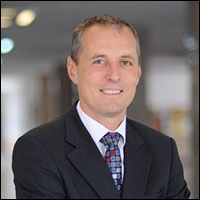 Mario Kovač is full professor at the Faculty of Electrical Engineering and Computing (FER), University of Zagreb, Croatia and Director of HPC Architectures and Applications Research Center at FER. He received his PhD in computer science and engineering from the same university in 1995. He was awarded Fulbright scholar award for Computer Science and Engineering Research that he spent at the University of South Florida, Tampa, USA between 1990 and 1994. His special focus was on efficient chip implementation of architectures for image, video and math computation processing that led to several chips including Jaguar chip. He holds several US and international patents in multimedia and architecture domains. His work on architectures and efficient execution was focused over time in several industry domains: multimedia systems, large national/cross-national health-care systems, electric cars and other. In 2008, Croatian President awarded him with the Medal of Honor "Order of Danica Hrvatska with the image of Ruđer Bošković" for special merit in science. His professional activities throughout years were always intertwined combination of science and industry activities. He was President/Vice-president of the Board and CxO of several organisations and companies where he was primarily involved in strategic management and R&D.
Mario Kovač is full professor at the Faculty of Electrical Engineering and Computing (FER), University of Zagreb, Croatia and Director of HPC Architectures and Applications Research Center at FER. He received his PhD in computer science and engineering from the same university in 1995. He was awarded Fulbright scholar award for Computer Science and Engineering Research that he spent at the University of South Florida, Tampa, USA between 1990 and 1994. His special focus was on efficient chip implementation of architectures for image, video and math computation processing that led to several chips including Jaguar chip. He holds several US and international patents in multimedia and architecture domains. His work on architectures and efficient execution was focused over time in several industry domains: multimedia systems, large national/cross-national health-care systems, electric cars and other. In 2008, Croatian President awarded him with the Medal of Honor "Order of Danica Hrvatska with the image of Ruđer Bošković" for special merit in science. His professional activities throughout years were always intertwined combination of science and industry activities. He was President/Vice-president of the Board and CxO of several organisations and companies where he was primarily involved in strategic management and R&D.
Jesús Labarta
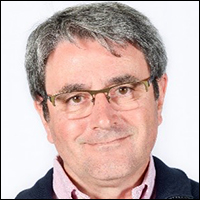 Prof. Jesús Labarta received his Ph.D. in Telecommunications Engineering from UPC in 1983, where he has been a full professor of Computer Architecture since 1990. He was Director of European Center of Parallelism at Barcelona from 1996 to the creation of BSC in 2005, where he is the Director of the Computer Sciences Dept. His research team has developed performance analysis and prediction tools and pioneering research on how to increase the intelligence embedded in these performance tools. He has also led the development of OmpSs and influenced the task based extension in the OpenMP standard. He has led the BSC cooperation with many IT companies. He is now responsible of the POP center of excellence providing performance assessments to parallel code developers throughout the EU and leads the RISC-V vector accelerator within the EPI project. He has pioneered the use of Artificial Intelligence in performance tools and will promote their use in POP, as well as the AI-centric co-designing of architectures and runtime systems. He was awarded the 2017 Ken Kennedy Award for his seminal contributions to programming models and performance analysis tools for high performance computing, being the First Non US Researcher receiving it.
Prof. Jesús Labarta received his Ph.D. in Telecommunications Engineering from UPC in 1983, where he has been a full professor of Computer Architecture since 1990. He was Director of European Center of Parallelism at Barcelona from 1996 to the creation of BSC in 2005, where he is the Director of the Computer Sciences Dept. His research team has developed performance analysis and prediction tools and pioneering research on how to increase the intelligence embedded in these performance tools. He has also led the development of OmpSs and influenced the task based extension in the OpenMP standard. He has led the BSC cooperation with many IT companies. He is now responsible of the POP center of excellence providing performance assessments to parallel code developers throughout the EU and leads the RISC-V vector accelerator within the EPI project. He has pioneered the use of Artificial Intelligence in performance tools and will promote their use in POP, as well as the AI-centric co-designing of architectures and runtime systems. He was awarded the 2017 Ken Kennedy Award for his seminal contributions to programming models and performance analysis tools for high performance computing, being the First Non US Researcher receiving it.
Leslie Lamport
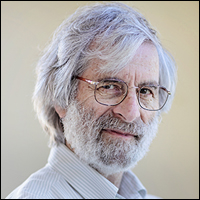 Dr. Lamport's research has been centered on concurrency and fault-tolerance. He is the inventor of several well-known concurrent and distributed algorithms, including early algorithms for tolerating "Byzantine" faults. He has also developed methods for formally specifying and verifying concurrent systems. Dr. Lamport has received six honorary doctorates, the PODC Influential Paper Award, two Dijkstra Prizes in Distributed Computing, three ACM SIGOPS Hall of Fame Awards, two Jean-Claude Laprie Awards in Dependable Computing, the IEEE Piore Award, the IEEE John von Neumann Medal, and the ACM Turing award. He has been elected to the U.S. National Academy of Sciences, the U.S. National Academy of Engineering, and the American Academy of Arts and Sciences.
Dr. Lamport's research has been centered on concurrency and fault-tolerance. He is the inventor of several well-known concurrent and distributed algorithms, including early algorithms for tolerating "Byzantine" faults. He has also developed methods for formally specifying and verifying concurrent systems. Dr. Lamport has received six honorary doctorates, the PODC Influential Paper Award, two Dijkstra Prizes in Distributed Computing, three ACM SIGOPS Hall of Fame Awards, two Jean-Claude Laprie Awards in Dependable Computing, the IEEE Piore Award, the IEEE John von Neumann Medal, and the ACM Turing award. He has been elected to the U.S. National Academy of Sciences, the U.S. National Academy of Engineering, and the American Academy of Arts and Sciences.
Francesco Minervini
 Francesco Minervini received the MSc. and the BSc. from the University of Rome "La Sapienza" in 2018 and 2015, respectively. He has been working as an RTL Research Engineer for BSC since 2018, as the main designer of the EPI Vector Processing Unit. He is also a Ph.D. candidate at the Polytechnic University of Catalonia (UPC). His main interests are on vector architectures, reconfigurable interconnects, and multi-core systems.
Francesco Minervini received the MSc. and the BSc. from the University of Rome "La Sapienza" in 2018 and 2015, respectively. He has been working as an RTL Research Engineer for BSC since 2018, as the main designer of the EPI Vector Processing Unit. He is also a Ph.D. candidate at the Polytechnic University of Catalonia (UPC). His main interests are on vector architectures, reconfigurable interconnects, and multi-core systems.
Mauro Olivieri
 Mauro Olivieri received the Master (Laurea) degree in electronics engineering and the Doctorate degree in electronics and computer engineering from the University of Genoa, Italy, where he was assistant professor from 1995 to 1998. In 1998 he joined Sapienza University of Rome as associate professor, teaching Digital Electronics and Digital Integrated System Architectures. His research interests are digital system-on-chip design, microprocessor core design and digital nano-scale circuits. He was the scientific responsible for Sapienza University for 2 FP7 ENIAC JU European projects, 1 FP7 IAPP European project, 4 PRIN/FIRB national projects, 11 MIUR University Projects, and 8 industrial research contracts. He was a technical expert for the Italian Economic Development Ministry in the “Smart Specialization Strategy” project on the topic “Smart Cities/Communities”. He is an evaluator for the European Commission in the ECSEL Joint Undertaking. He is a visiting researcher at the Barcelona Supercomputing Center within the European Processor Initiative project. He authored over 150 papers and a textbook in three volumes on digital VLSI design. He has been a TPC member of IEEE DATE and was General Co-Chair of IEEE/ACM ISLPED’15. He is a senior member of the IEEE.
Mauro Olivieri received the Master (Laurea) degree in electronics engineering and the Doctorate degree in electronics and computer engineering from the University of Genoa, Italy, where he was assistant professor from 1995 to 1998. In 1998 he joined Sapienza University of Rome as associate professor, teaching Digital Electronics and Digital Integrated System Architectures. His research interests are digital system-on-chip design, microprocessor core design and digital nano-scale circuits. He was the scientific responsible for Sapienza University for 2 FP7 ENIAC JU European projects, 1 FP7 IAPP European project, 4 PRIN/FIRB national projects, 11 MIUR University Projects, and 8 industrial research contracts. He was a technical expert for the Italian Economic Development Ministry in the “Smart Specialization Strategy” project on the topic “Smart Cities/Communities”. He is an evaluator for the European Commission in the ECSEL Joint Undertaking. He is a visiting researcher at the Barcelona Supercomputing Center within the European Processor Initiative project. He authored over 150 papers and a textbook in three volumes on digital VLSI design. He has been a TPC member of IEEE DATE and was General Co-Chair of IEEE/ACM ISLPED’15. He is a senior member of the IEEE.
Camila Pontes
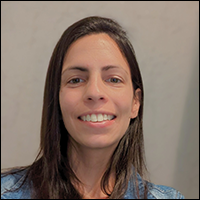 Camila Pontes is a Postdoctoral Researcher at the Barcelona Supercomputing Center (BSC) with an interdisciplinary background in Biology and Computer Science. After obtaining her MSc and PhD degrees in Computational Biology, she was awarded the “Juan de la Cierva – Formación'' fellowship by the Spanish government. Over the last three years, she has been working on different European Projects in the fields of Health and Biotechnology, focusing on applying protein Language Models (pLMs) to protein design.
Camila Pontes is a Postdoctoral Researcher at the Barcelona Supercomputing Center (BSC) with an interdisciplinary background in Biology and Computer Science. After obtaining her MSc and PhD degrees in Computational Biology, she was awarded the “Juan de la Cierva – Formación'' fellowship by the Spanish government. Over the last three years, she has been working on different European Projects in the fields of Health and Biotechnology, focusing on applying protein Language Models (pLMs) to protein design.
Arvind Ramanathan
 Arvind Ramanathan is a computational biologist in the Data Science and Learning Division at Argonne National Laboratory and a senior scientist at the University of Chicago Consortium for Advanced Science and Engineering (CASE). His research interests are at the intersection of data science, high performance computing and biological/biomedical sciences.
Arvind Ramanathan is a computational biologist in the Data Science and Learning Division at Argonne National Laboratory and a senior scientist at the University of Chicago Consortium for Advanced Science and Engineering (CASE). His research interests are at the intersection of data science, high performance computing and biological/biomedical sciences.
Javier Sabariego
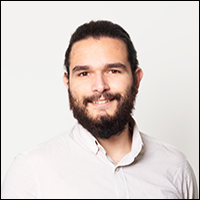 Backend and infrastructure engineer at Qilimanjaro-Quantum Tech.
Backend and infrastructure engineer at Qilimanjaro-Quantum Tech.
Victor Sanchez
 Quantum Software Engineer specialized in quantum control with superconducting qubits at Qilimanjaro-Quantum Tech.
Quantum Software Engineer specialized in quantum control with superconducting qubits at Qilimanjaro-Quantum Tech.
Michela Taufer
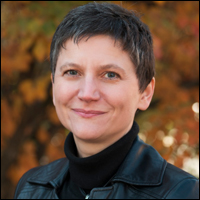 Michela Taufer is an AAAS Fellow and an ACM Distinguished Scientist. She holds the Jack Dongarra Professorship in High-Performance Computing in the Department of Electrical Engineering and Computer Science at the University of Tennessee Knoxville (UTK). She earned her undergraduate degrees in Computer Engineering from the University of Padova (Italy) and her doctoral degree in Computer Science from the Swiss Federal Institute of Technology or ETH (Switzerland). She has a long history of interdisciplinary work with scientists. Her research interests include software applications and their advance programmability in heterogeneous computing (i.e., multi-core platforms and GPUs); cloud computing and volunteer computing; and performance analysis, modeling and optimization of multi-scale applications. She has been serving as the principal investigator of several NSF collaborative projects. She also has significant experience in mentoring a diverse population of students on interdisciplinary research.Her community service includes efforts to spread high-performance computing participation in undergraduate education and research as well as efforts to increase the interest and participation of diverse populations in interdisciplinary studies.
Michela Taufer is an AAAS Fellow and an ACM Distinguished Scientist. She holds the Jack Dongarra Professorship in High-Performance Computing in the Department of Electrical Engineering and Computer Science at the University of Tennessee Knoxville (UTK). She earned her undergraduate degrees in Computer Engineering from the University of Padova (Italy) and her doctoral degree in Computer Science from the Swiss Federal Institute of Technology or ETH (Switzerland). She has a long history of interdisciplinary work with scientists. Her research interests include software applications and their advance programmability in heterogeneous computing (i.e., multi-core platforms and GPUs); cloud computing and volunteer computing; and performance analysis, modeling and optimization of multi-scale applications. She has been serving as the principal investigator of several NSF collaborative projects. She also has significant experience in mentoring a diverse population of students on interdisciplinary research.Her community service includes efforts to spread high-performance computing participation in undergraduate education and research as well as efforts to increase the interest and participation of diverse populations in interdisciplinary studies.
Mireia Tena
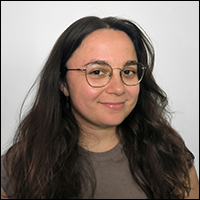 Quantum Engineer specialized in the characterization and calibration of superconducting qubit systems at Qilimanjaro-Quantum Tech.
Quantum Engineer specialized in the characterization and calibration of superconducting qubit systems at Qilimanjaro-Quantum Tech.
Mateo Valero
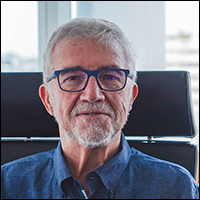 Mateo Valero, http://www.bsc.es/cv-mateo/" is professor of Computer Architecture at Technical University of Catalonia (UPC) and is the Founding Director of the Barcelona Supercomputing Center, where his research focuses on high performance computing architectures. He has published approximately 700 papers, has served in the organization of more than 300 International Conferences and has given more than 800 invited talks.
Mateo Valero, http://www.bsc.es/cv-mateo/" is professor of Computer Architecture at Technical University of Catalonia (UPC) and is the Founding Director of the Barcelona Supercomputing Center, where his research focuses on high performance computing architectures. He has published approximately 700 papers, has served in the organization of more than 300 International Conferences and has given more than 800 invited talks.
Prof. Valero has been honored with numerous awards, among them: The Eckert-Mauchly Award 2007 by IEEE (Institute of Electrical and Electronics Engineers) and ACM (Association for Computing Machinery), the Seymour Cray Award 2015 by IEEE and the Charles Babbage 2017 by IEEE. Among other awards, Prof. Valero has received The Harry Goode Award 2009 by IEEE, The Distinguished Service Award by ACM and the Spanish National awards “Julio Rey Pastor” and “Leonardo Torres Quevedo”. Prof. Valero is a "Hall of the Fame" member of the ICT European Program (selected as one of the 25 most influents European researchers in IT during the period 1983-2008, Lyon, November 2008). In 2020 he was awarded the “HPCWire Reader’s Choice Awards” “for his exceptional leadership in HPC” and for “being an HPC pioneer since 1990 and the driving force behind the renaissance of European HPC independence”. He has been also honored with “Condecoración de la Orden Mexicana del Águila Azteca” 2018, the highest recognition granted by the Mexican Government. Prof. Valero holds Honorary Doctorate by 11 Universities, is member of 10 academies and a fellow of IEEE and ACM, and Fellow of AAIA, Asia-Pacific Artificial Intelligence Association. In 1998 Mateo Valero was distinguished as “Favourite Son” of his home town, Alfamén (Zaragoza) and in 2006, his native town of Alfamén named its Public School after him".
Priya Darshan Vashishta
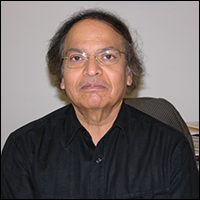 Priya Vashishta is the Director of the Collaboratory for Advanced Computing and Simulations. He has multidisciplinary appointments in the Viterbi School of Engineering and College of Letters, Arts and Sciences. Vashishta is Flour Professor of Engineering. in the Mork Family Department of Chemical Engineering and Materials Science with joint appointments in Physics & Astronomy and Computer Science. Prior to joining USC, Priya Vashishta was the Cray Research Professor of Computational Sciences at the Louisiana State University. Before that he was the Director of the Solid State Science Division at the Department of Energy’s Argonne National Laboratory. His research interests include multimillion-billion atom materials simulations of semiconducting, ceramic and polymeric materials using deep neural networks, recurrent and attention based neural networks on petascale supercomputers. and as well as on soon-to-arrive exascale computers. Current simulation effort focuses on machine learning and quantum materials. He has published 500+ research papers, 13 book chapters, 11 edited books and given 350+ invited lectures at conferences and workshops.
Priya Vashishta is the Director of the Collaboratory for Advanced Computing and Simulations. He has multidisciplinary appointments in the Viterbi School of Engineering and College of Letters, Arts and Sciences. Vashishta is Flour Professor of Engineering. in the Mork Family Department of Chemical Engineering and Materials Science with joint appointments in Physics & Astronomy and Computer Science. Prior to joining USC, Priya Vashishta was the Cray Research Professor of Computational Sciences at the Louisiana State University. Before that he was the Director of the Solid State Science Division at the Department of Energy’s Argonne National Laboratory. His research interests include multimillion-billion atom materials simulations of semiconducting, ceramic and polymeric materials using deep neural networks, recurrent and attention based neural networks on petascale supercomputers. and as well as on soon-to-arrive exascale computers. Current simulation effort focuses on machine learning and quantum materials. He has published 500+ research papers, 13 book chapters, 11 edited books and given 350+ invited lectures at conferences and workshops.
Miguel Vázquez
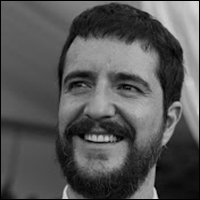 Miguel is a doctor of computer engineering that has always worked in the field of bioinformatics. He learned data mining back in 2001 and has since had a passion for data analysis, which is what led him into the area of biology, where he found much interesting data. He has worked in the Spanish National Cancer Research Center in Madrid and the Norwegian Institute of Technology in Trondheim where he participated in national and international projects analysing cancer genomics and modeling cancer drug response, among other things. Miguel joined the BSC in 2017 to lead the Genome Informatics unit and has since focused on designing workflows for analysing biological data on HPC environments and in particular using artificial intelligence and large language models.
Miguel is a doctor of computer engineering that has always worked in the field of bioinformatics. He learned data mining back in 2001 and has since had a passion for data analysis, which is what led him into the area of biology, where he found much interesting data. He has worked in the Spanish National Cancer Research Center in Madrid and the Norwegian Institute of Technology in Trondheim where he participated in national and international projects analysing cancer genomics and modeling cancer drug response, among other things. Miguel joined the BSC in 2017 to lead the Genome Informatics unit and has since focused on designing workflows for analysing biological data on HPC environments and in particular using artificial intelligence and large language models.
Finn Wilkinson
 Finn Wilkinson is a third year PhD student with Arm in the High Performance Computing Group at the University of Bristol. This is also where he received his MEng in Computer Science (2021). Under the supervision of Prof. Simon McIntosh-Smith and Dr Tom Deakin, his research primarily focuses on the simulation of CPU microarchitectures within the HPC domain, with a specific focus on Arm's Scalable Matrix Extension. His other research interests include novel processor architectures, modern GPU architectures, and the performance of BLAS on heterogeneous systems. Finn is also one of the main developers of the Simulation Engine (SimEng); an open-source, cycle-level design space exploration tool for accurately and easily modelling complex processor microarchitectures.
Finn Wilkinson is a third year PhD student with Arm in the High Performance Computing Group at the University of Bristol. This is also where he received his MEng in Computer Science (2021). Under the supervision of Prof. Simon McIntosh-Smith and Dr Tom Deakin, his research primarily focuses on the simulation of CPU microarchitectures within the HPC domain, with a specific focus on Arm's Scalable Matrix Extension. His other research interests include novel processor architectures, modern GPU architectures, and the performance of BLAS on heterogeneous systems. Finn is also one of the main developers of the Simulation Engine (SimEng); an open-source, cycle-level design space exploration tool for accurately and easily modelling complex processor microarchitectures.











